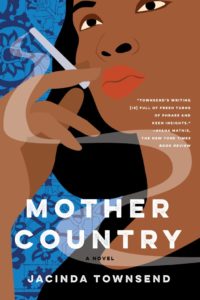 Choices that Ache:
Choices that Ache:
A Review of Jacinda Townsend’s Mother Country
by Brianna Avenia-Tapper
“What, after all, to make of a choice?” Some choices are harder than others. Jacinda Townsend’s second novel, Mother Country, unfolds as a richly embodied exploration of choice in all its complexity. Townsend’s first novel Saint Monkey won the James Fenimore Cooper Prize in 2015. In Mother Country, she intertwines the lives of two protagonists in vastly different contexts such that readers are forced to consider the internal, external, and temporal forces that complicate clean and easy understandings of choice.
Both protagonists are mothers. The first mother, Souria, is an escaped teenage slave from Mauritania. Souria gives birth to her daughter, Yu, in Marrakesh, and then bravely escapes prostitution by fleeing, with Yu, to the seaside town of Essaouira. It is in Essaouira that the second protagonist, Shannon, comes upon toddler Yu in an alley. Swamped by medical debt and student loans, Shannon has married the financially stable but boring Vlad, and is accompanying him on a work trip to Morocco. Shannon has recently survived a car accident that left her with a scarred face, a problematic uterus, and chronic pain. Townsend writes,
“It was possible that before the accident, she’d also been in pain, a pain so constant, so much a part of her fiber, that it had gone undetected…it was possible that she was still her parents’ poor, dumb daughter, a rabbit trapped in a cage, her ears sticking up beyond the metal bars to listen for that which might save her.”
Shannon lures Yu back to her hotel room with promises of ice cream, and blackmails the consulate into providing Yu (who Shannon renames Mardi) with the paperwork necessary to take her back to the US. Souria grieves her missing daughter, but does not alert the authorities for fear of deportation.
Throughout the many intersections at which all of these lovingly rendered characters stand, Townsend asks us to consider choice. How are our choices constrained by biology, by our bodies’ ability or inability to grow new human beings? How do our economic, religious, and political systems shape our opportunities for action and our choices? How do racism and colorism shape our choices? How does the patriarchal imperative for women to have children shape our choices? How are our choices constrained by the capitalist assumption that individuals are responsible for the expense of their own healthcare and education? How are our choices shaped by the belief that Allah always knows best?
Back in the States, Townsend evokes the perspective of a semi-verbal, traumatized yet brilliant toddler by putting us in the center of Yu/Mardi, presenting her mind as a piece of her body she can reflect on, like a leg or an arm. In Yu/Mardi’s voice, Townsend writes,
“… I make the vocal chords scream …the frontal lobe is just beside me, but even when it begins to learn the man and woman’s language, it screams all night…My name is Yunmi, and though no one calls me it anymore, the whole of me knows this deeply all the way through the skin, through the skull, through the accordion folds of the cerebrum.”
These passages capture the splitting and dissociation so often necessary for surviving trauma, and highlight how our minds—those organs of choice—are also a product of our experience.
As a mother reading this book, I was particularly struck by the loneliness and longing that formed the aching heart of the text. I felt Souria’s longing for her “laughing brother”, and Shannon’s longing for her cold and distant mother. I felt Yu’s longing for home, and Souria’s longing for her lost child. Of Souria, Townsend writes, “She wakes up in the middle of the night dreaming she has felt Yu’s hand on her cheek, but when she turns over to empty space, she remembers…”
This loneliness and longing read as a consequence of patriarchal oppression, capitalism, caste systems, colonialism, but they also evoke that terrible truth: mothering is the work of helping another person become strong enough to leave you. Townsend writes about this impossible predicament in rich, immersive prose that pulses with bone-deep empathy and shines with sociological and psychological insight. Read this book to see the world with more nuance. Read it to love more deeply.
Mother Country by Jacinda Townsend
Graywolf Press, May 2022, $17
ISBN: 9781644450871
Brianna Avenia-Tapper is a writer, mother, and Profiles Editor at Literary Mama. She is working on a memoir: Carrying Heavy Things: Babies, Backpacks, and Bolsheviks, and a novel about a mother who runs away to the woods with her children in a wheelbarrow. More of her work can be found at briannaveniatapper.com.
